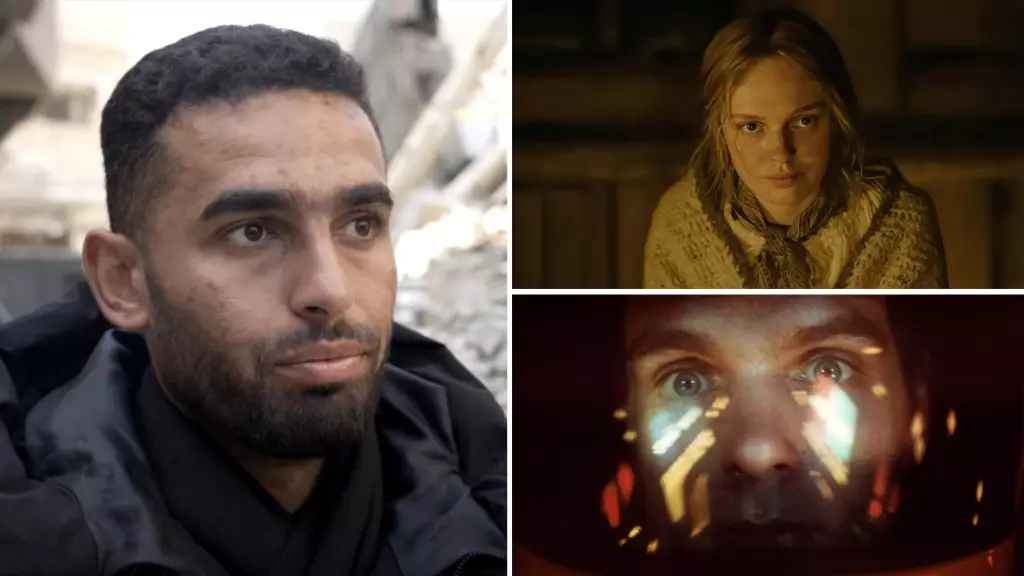As the awards season approaches, a significant contender has emerged that highlights the ongoing humanitarian crises in Gaza: “From Ground Zero.” This compelling documentary, which has secured a spot on the shortlist for the Best International Feature at the Oscars, opens at around 70 locations, including top AMC theaters and select independent cinema in major markets. Produced by Watermelon Pictures and spearheaded by Gaza native Rashid Masharawi, the film is a raw collection of 22 video diaries created by Palestinian filmmakers. These diaries chronicle daily life amid continual Israeli bombardments, painting a vivid picture of survival, resilience, and community amid chaos.
Unlike many portrayals of conflict, “From Ground Zero” opts for a more personal view, steering clear of overt political narratives. Instead, it captures fleeting moments of hope and humanity amidst hellish circumstances. This nuanced perspective is vital, as it humanizes the struggles faced by individuals, emphasizing their creativity and resilience. As Masharawi himself notes, the documentary serves as “an unfiltered window into the resilience, creativity, and humanity” of those caught in war. This launch is not just a cinematic release; it is a crucial moment for bringing these poignant stories into broader discussions.
The film’s release comes amidst a competitive theatrical market, which includes both major studio films and independent projects. AMC’s willingness to collaborate with smaller films is commendable, exemplifying the importance of diverse narratives in a saturated market. Justin DiPietro, the newly appointed EVP at MPI, is leading this initiative, indicating a robust strategy aimed at fostering unique cinematic voices. This approach is particularly relevant given the film’s timely release as Oscar voting begins soon after, potentially influencing broader public and industry awareness of the Palestinian plight.
“The Damned”: A Tense Exploration of Morality and Survival
In contrast to the documentary’s hopeful narrative, the horror-thriller “The Damned,” directed by Thordur Palsson, enters theaters with a contrasting theme—ethical dilemmas amid survival. Set against an isolated Icelandic backdrop, the film follows a widow, played by Odessa Young, faced with an agonizing choice after a shipwreck occurs in the unforgiving depths of winter. The tension is palpable as the community must choose whether to save the shipwrecked crew or focus on their own survival.
“The Damned” not only explores themes of guilt and communal responsibility but also raises essential questions about the nature of moral choices in life-threatening situations. With an impressive ensemble cast, including Joe Cole and Rory McCann, the film conveys a sense of urgency and dread that mirrors real-world ethical quandaries. The film’s opening on 732 screens reflects a conscious effort to engage viewers who are drawn to stories that delve into psychological horror and ethical complexities.
The contrasting releases of “From Ground Zero” and “The Damned” highlight the diversity of contemporary cinema—where documentaries can share vital social messages while thrillers can provoke discussions about morality. Both films underscore an essential element of filmmaking: the power of storytelling to reflect our realities and incite introspection.
Cinematic Reflections on Artificial Intelligence
Beyond these powerful narratives lies a fascinating exploration of technology and its implications for society. New York City’s Film Forum is presenting a retrospective titled “From Metropolis to Ex Machina,” focusing on how cinema has historically depicted artificial intelligence. Spanning almost a century, the program showcases films that have warned audiences about the potential malevolence of AI long before the term became mainstream.
With standout films from Fritz Lang’s “Metropolis” to Stanley Kubrick’s “2001: A Space Odyssey,” the retrospective illustrates a critical discourse on AI’s evolving role in society. The programming emphasizes not just the technological advancements but also the ethical implications of AI. As Bruce Goldstein, the event’s curator, points out, the portrayal of AI often reflects societal fears. The retrospective is more than just a historical overview; it allows viewers to reflect on the implications of emerging technologies in their lives, making it a resonant topic amidst recent developments in artificial intelligence.
As the cinematic landscape continues to evolve, it is crucial to engage with films that address pressing humanitarian issues while also provoking thought about future challenges. “From Ground Zero” and “The Damned,” alongside retrospective studies of AI, exemplify cinema’s unique capacity to reflect on human experience, resilience, and ethical dilemmas. Through diverse storytelling, audiences are empowered to confront difficult truths and engage in meaningful discourse, reinforcing theater’s relevance in contemporary society. These film endeavors ultimately act as a mirror to society, urging reflection, understanding, and action in an ever-complex world.
